

Blind Man Test Drives Google's Autonomous Car. Behold! Or rather, don't: Bendy see-through DRAM. High performance access to file storage Boffins at Rice uni in the States have devised bendy transparent memory chips using pure silicon crystals.

James Tour, a polymath chemist at the university working at the Tour Lab - he is also a professor of mechanical engineering and materials science and of computer science, as well as Rice’s T.T. and W.F. Chao Chair in Chemistry, revealed the see-through memory chip an an American Chemical Society meeting in San Diego. Transparent flexible RAM (Rice University) How bots are taking over the world. 'We’ve started to see numbers of humans pretending to be bots, a strange development that signals a shift in the power and identity politics of the internet.' Photograph: Blutgruppe/zefa/Corbis As part of the Esc and Ctrl series, Jon Ronson recently published two videos on Comment is free in which he confronts a spambot version of himself and accuses it of stealing his identity.

How will the new law on cookies affect internet browsing? We are being watched.
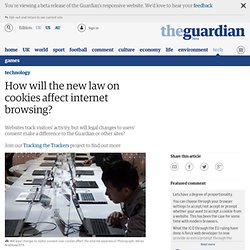
The websites we visit, and the advertisers who promote products on those sites, are tracking our online activity, building a profile of where we go and in some cases what we do when we get there. The computer on which this article is being written has no fewer than 2,901 tracking files (known as cookies) monitoring its online activity, from sites including Google (121 cookies), Amazon (14), the UK government (46) and dozens upon dozens of advertising networks. These track different things: some monitor which sites are visited, some track which adverts are clicked, others store and report back on preferences and favourites on different sites. Google Project Glass: will we really wear digital goggles? The first surprising thing about Google Glasses is that anybody thinks this is a new idea (just have a look at this history of mobile augmented reality).
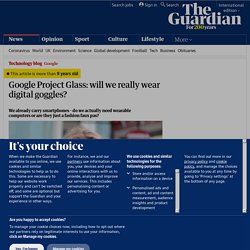
Steve Mann, a Canadian known as the father of wearable computing, has been developing systems since the 1980s with obvious industrial, medical and military applications. One example is the Battlefield Augmented Reality System, where having information overlayed on your view of the world could be a matter of life and death. The second surprising thing is that we aren't all wearing computerised glasses already.
In a 2001 Guardian article titled "From man to borg – is this the future? ", I quoted a wearable computers website claim that "large scale acceptance of wearables in the general consumer market will surge in about 2005. Early users of wearable computers with head-mounted displays considered it a triumph if people didn't cross the street to avoid them. But Google is just one of hundreds of companies working on similar ideas. Half a million Mac computers 'infected with malware' 5 April 2012Last updated at 08:54 ET Dr Web says most infected computers are in the US More than half a million Apple computers have been infected with the Flashback Trojan, according to a Russian anti-virus firm.
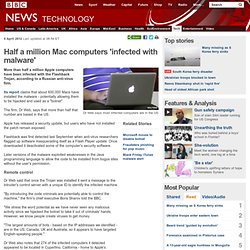
Its report claims that about 600,000 Macs have installed the malware - potentially allowing them to be hijacked and used as a "botnet". Esc and Ctrl: Jon Ronson v 'Jon Ronson' spambot - video. Jon Ronson v 'Jon Ronson' spambot ... part two - video. Icann's internet suffix application deadline looms. 12 April 2012Last updated at 10:10 ET Canon could start publishing pages ending in its brand name if it secures the suffix Organisations wishing to buy web addresses ending in their brand names have until the end of Thursday to submit applications.
For example, drinks giant Pepsi can apply for .pepsi, .gatorade or .tropicana as an alternative to existing suffixes such as .org or .com. Parties are able to request up to 50 web address endings. The Internet Corporation for Assigned Names and Numbers plans to publish application details on 30 April. Football bots: robots play a football match in Iran - in pictures.
Future - Technology - Future of computer interaction: Brain control. The computer keyboard and TV remote control may be the ways we interact with our technology today, but new ideas are appearing all the time.
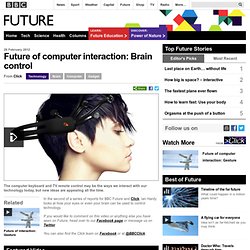
Hands on with the Apple iPad 3. Big Security for Big Data First look Last night, Apple CEO Tim Cook revealed the company’s latest tablet.
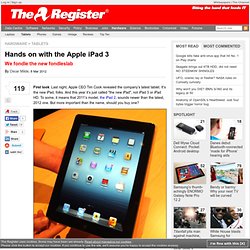
It’s the new iPad, folks. And this year it’s just called "the new iPad", not iPad 3 or iPad HD. To some, it means that 2011’s model, the iPad 2, sounds newer than the latest, 2012 one. If year > 2013 then PC != Personal Computer. High performance access to file storage The abbreviation 'PC' will soon no longer stand for 'Personal Computer', but 'Personal Cloud'.
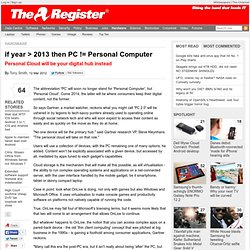
Come 2014, the latter will be where consumers keep their digital content, not the former. So says Gartner, a market watcher, reckons what you might call 'PC 2.0' will be ushered in by legions to tech-savvy punters already used to operating online through social network tech and who will soon expect to access their content as easily and as quickly on the move as they do at home.